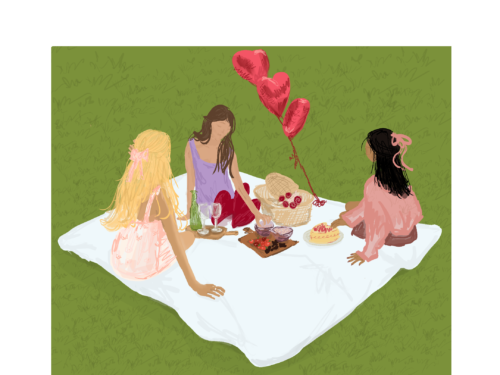When I was younger, I wasn’t allowed to have a best friend. My mom had set a rule: I couldn’t hang out with one friend substantially more than any other in an effort to stop me from isolating myself from my peers. I was told those deep connections were found through romantic relationships. By approaching friendships by casting a wide net, I was limited in the quality of the individual bonds that I had. I rarely reached the 200 hours that research has shown it takes to make a close friend.
When I got to Harvard, I went about friendships and relationships in the same way. Romantic love was prioritized over platonic love, and the more (and inherently shallower) friendships I had, the better. After a breakup and some lonely months my sophomore year, I realized that the deep connections I was always searching for romantically were no more valuable than the deep connections I could form with my friends if I prioritized quality rather than quantity.
Treating my friendships with the same level of priority that I previously gave to romantic relationships led to more stability in my life, fewer broken hearts, and a level of care in my everyday life that I did not know was possible. Intimacy in friendships often differs markedly from that of romantic relationships, in part from the absence of sexual appeal which allows chemistry to form more organically and independently of physical attraction. In relationships, attractiveness or romantic chemistry can override a lack of fundamental compatibility.
At Harvard, occupational and academic stability overrides emotional health and happiness. Your career always comes first, and finding a problem-set partner is regarded as more important than finding someone to call when you’re sick and can’t make it to the dining hall. If Harvard students understand their academic success is directly proportional to relying on other classmates, why can they not apply this logic to the profound results of investing in friendship?
Even once I realized that I needed to prioritize my friendships and focus on building deeper connections, Harvard’s environment seemed to fight against me. Blocking turned friendships into a competition, where having a friend group was prioritized over having strong individual bonds. Ada Cruz ’24 remarked, “Harvard is an environment that doesn’t necessarily encourage deep connections because you’re so busy doing your own thing every day and running around. Figuring things out is very overwhelming and so friendship is just kind of ‘let’s get lunch together.’ It never happens.” It isn’t that there is a lack of intention for deeper friendships, it’s simply that the pressure of recruiting, grad school, punch, internships, extracurriculars, etc. all get in the way of following through on these intentions.
Several conversations with friends reveal the growing phenomenon of our peers disappearing once they get into a romantic relationship—neglecting the platonic love in their life. Cruz also undervalued the potential intimacy between best friends when she arrived at Harvard. “I think people aren’t intentional enough about friendship. It’s kind of just something you do growing up, but really, making deep, deep connections [at Harvard] was something that I hadn’t really done. I realized that when I only stayed in contact with very few of my high school friends.”
When I posed this question to other Harvard students, they immediately defended the benefits of their romantic relationships: someone to lean on, eat dinner with, show up to performances or sports games—many of these also found in positive, platonic friendships.
Just as with romantic relationships, platonic friendships have been proven to improve emotional stability and lead to a longer life. However, these friendships are often the first thing to be put on the back burner when life gets stressful. According to journalist Lydia Dentworth, “Science has clarified the definition of a quality relationship. It has to have these minimum three things: It’s a stable, longstanding bond; it’s positive; and it’s cooperative—it’s helpful, reciprocal, I’m there for you, you’re there for me.” Note the lack of specificity when it comes to type of relationship; both platonic and romantic relationships can fulfill this definition.
There is an irony to friendships at Harvard. This school is filled with some of the most incredible individuals that the world has to offer. There are dedicated athletes, world-class musicians, and mathematical geniuses. Cruz said, “The people here are literally so unlike any other community that I’ve ever been in. So, you have such a good opportunity to meet people that are so cool and just so ‘I want you to be in my life.’ I want to hear your story and share life with you.” However, this potential is consistently squandered. So, if there’s one thing I can ask of the reader today, it’s to follow up with a time and place when someone asks you to grab a meal.
Kate De Groote ’24.5 (katedegroote@college.harvard.edu) believes in galentines over valentines.

